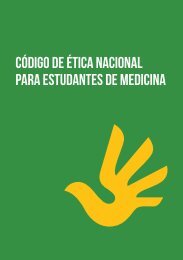Ethical Code for Medical Students
Create successful ePaper yourself
Turn your PDF publications into a flip-book with our unique Google optimized e-Paper software.
NATIONAL ETHICAL CODE<br />
FOR MEDICAL STUDENTS
PREAMBLE<br />
When clinical practice begins, we, as medical students, are<br />
confronted with human life and obliged to know how to deal with<br />
what is subjacent to it.<br />
Despite not required to follow the Deontological <strong>Medical</strong> <strong>Code</strong>,<br />
during our education in the clinical context, we ought to demonstrate<br />
suitable standards of conduct towards the Patient.<br />
This <strong>Ethical</strong> <strong>Code</strong> intends to be extended to a National level, and<br />
it was thought <strong>for</strong> by <strong>Students</strong> and <strong>for</strong> <strong>Students</strong>, with the purpose of<br />
creating a uni<strong>for</strong>m conduct code <strong>for</strong> all Portuguese <strong>Medical</strong> Schools,<br />
without prejudice to the existing <strong>Ethical</strong> <strong>Code</strong>s and bylaws.<br />
It is intended to be a set of recommendations that can be consulted<br />
by the <strong>Students</strong> be<strong>for</strong>e beginning their journey through the clinical<br />
setting.<br />
This <strong>Ethical</strong> <strong>Code</strong> is integrated in the National <strong>Medical</strong> Ethics<br />
Program of ANEM Portugal. It was built because we believe that <strong>Medical</strong><br />
Education should not only be directed to the technical and scientific<br />
components but also to the increasing concern on the development of<br />
the humanistic features inherent to healthcare professionals.<br />
We aim to make the <strong>Ethical</strong> <strong>Code</strong> available in a digital <strong>for</strong>mat, in<br />
the ANEM Portugal website, so that it can be consulted by all <strong>Medical</strong><br />
<strong>Students</strong>. Furthermore, it should be handed out to the <strong>Students</strong> who<br />
participate in the White Coat Ceremony of each Portuguese <strong>Medical</strong><br />
School.<br />
2
PORTUGUESE ETHICAL CODE<br />
1. General Principles<br />
2. Duties and Limitations of a <strong>Medical</strong> Student<br />
3. Relationship between the <strong>Medical</strong> Student and the Patient<br />
4. Relationship with Healthcare Professionals<br />
5. Free and In<strong>for</strong>med Consent<br />
6. <strong>Medical</strong> Confidentiality and Patient’s Privacy<br />
1. GENERAL PRINCIPLES<br />
The Student must recognise the privilege and responsibility that<br />
are intrinsic to a degree in Medicine, more specifically during the<br />
clinical practice years, when dealing with Patients.<br />
First, the Student must have access to high-quality education, as<br />
well as being respected and safeguarded in his or her status as a<br />
Student throughout the clinical practice.<br />
During the course of the programme, the Student must have an<br />
ethical conduct underlying what is expected from a Medicine Student<br />
and from a future Physician.<br />
The Student’s clinical practice must be based on the Fundamental<br />
<strong>Ethical</strong> Principles of Integrity, Beneficence, Non-Maleficence,<br />
Autonomy, Justice and Responsibility while considering the Patient as<br />
a free person.<br />
3
2. DUTIES AND LIMITATIONS<br />
OF A MEDICINE STUDENT<br />
The <strong>Medical</strong> Student must respect the General Duties and<br />
Limitations of a University Student, without prejudice to the existing<br />
<strong>Ethical</strong> <strong>Code</strong>s and bylaws. Nevertheless, there are certain specificities<br />
of the degree in Medicine that are important to be clarified regarding<br />
his or her Duties and Limitations.<br />
DUTIES<br />
1. Respect human life and dignity.<br />
2. Recognise the Patient as a vulnerable and free individual in the<br />
condition of Human Being.<br />
4<br />
3. Act on the Patient without any kind of discrimination.<br />
4. Consider the Doctor-Patient relationship as a learning<br />
environment and skills development opportunity, giving primacy to the<br />
acknowledgement of the Patient as a Human Being who is suffering,<br />
respecting the Patient above all.<br />
5. Respect the Patient when supporting their Autonomy.<br />
6. Recognise the right of the Patient to put <strong>for</strong>ward suggestions<br />
and complaints, by him or herself or by his or her legal representative.<br />
7. Respect the Patient’s privacy and underlying confidentiality, in<br />
each and every moment of the Student-Patient Relationship.<br />
8. Keep in<strong>for</strong>med and up to date with regards to the curricular<br />
year of medical education.<br />
9. Respect the Healthcare institutions’ own regulation when<br />
attending to a clerkship.
10. Respect the human cadaver and the cadaverous parts as<br />
<strong>for</strong>mer human entities, valuing their donation to education.<br />
LIMITATIONS<br />
1. <strong>Students</strong> should only per<strong>for</strong>m clinical actions they are familiar<br />
with and qualified to complete.<br />
2. Whenever the Patient and/or the Family ask <strong>for</strong> advice that<br />
is beyond the Student’s competence, the apprentice must in<strong>for</strong>m the<br />
tutoring physician or any other Healthcare professional capable of<br />
responding to the situation.<br />
5<br />
3.The Student cannot issue prescriptions or medical certificates.<br />
4.The Student must be aware that he or she cannot provide any<br />
in<strong>for</strong>mation known to him/her in result of the internship or clinical<br />
training to the Patient, family or caregiver.<br />
3. MEDICAL STUDENT - PATIENT<br />
RELATIONSHIP<br />
1. The medical Student must present him or herself as a Student,<br />
stating his name and his curricular year.<br />
2. The Student must recognize every human being as a single<br />
individual and consider age, gender, sociocultural context, sexual<br />
orientation, religion, philosophical or ideological beliefs without ever<br />
discriminate.<br />
3. The Student cannot, under any circumstance, reveal the
diagnosis, prognosis or complementary diagnostic outcomes of the<br />
Patient. Once the Patients holds the rights to access the data registered<br />
in his or her clinical process, the Student must alert the physician or the<br />
tutor, in case the Patient expresses the need to be in<strong>for</strong>med about his<br />
or her health situation or medical services available.<br />
4. The Student must pay attention to the Patient, register any<br />
complaints, understand and respect the anxieties of the Patient,<br />
helping to deconstruct preconceived ideas or myths, within his or her<br />
knowledge.<br />
5. The Student must play an active role in defending the Patient’s<br />
interests, in<strong>for</strong>ming his or her tutor about any situations which may<br />
endanger the physical, psychological and/or emotional well-being of<br />
the Patient.<br />
6. The Student must respect the Patient’s health status, not being<br />
allowed to interfere with the preventive, curative, rehabilitative or<br />
terminal care that is being provided, except when permission from the<br />
tutor is obtained.<br />
4. RELATIONSHIP WITH COLLEAGUES<br />
AND HEALTHCARE PROFESSIONALS<br />
1. The Student should be familiar with the organization of each<br />
ward, respecting each professional belonging to the team.<br />
2. The Student should, whenever necessary, ask <strong>for</strong> help and<br />
enlightenment in any task to be done.<br />
6<br />
3. The Student must respect his colleagues, regardless of their age,
gender, ethnic background, sexual orientation and beliefs.<br />
4. The Student should maintain a professional attitude whilst being<br />
kind and friendly with colleagues and health professionals.<br />
5. FREE AND INFORMED CONSENT<br />
1. The Student must introduce him or herself to the Patient and<br />
request <strong>for</strong> consent <strong>for</strong> any clinical act, after permission is granted<br />
from the tutor. When the patient is not capable of such consent, this<br />
must be secured from the patient’s legal representative.<br />
2. The Student must in<strong>for</strong>m the Patient about the procedure<br />
explaining its purpose and clarifying any questions, worries or<br />
concerns the Patient may have, within the knowledge the Student<br />
acquired.<br />
3. After ensuring that the Patient is in<strong>for</strong>med, the Student must let<br />
him or her decide freely, exercising his or her autonomy.<br />
4. The Student must respect the Patient’s decision, even if he or she<br />
does not authorize the clinical act or refuses the student to be present.<br />
5. The Student must respect the Patient’s Right to obtain a second<br />
opinion about his health status.<br />
7
6. MEDICAL CONFIDENTIALITY AND<br />
PATIENT’S PRIVACY<br />
1. The Student must have absolute respect <strong>for</strong> the confidentiality<br />
of the Patient’s in<strong>for</strong>mation, as well as the services he could have<br />
accessed during his clinical internship or education - disclosed by<br />
Patients, family or caretakers; including clinical in<strong>for</strong>mation obtained<br />
from complementary means of diagnosis and/or communications<br />
with doctors or other health care professionals.<br />
2. The Student must realize the importance of medical confidentiality<br />
<strong>for</strong> the establishment of a mutual relationship of trust, based on truth,<br />
between him/her and the Patient.<br />
3. The Student must ensure confidentiality is maintained even after<br />
the interaction finishes (this includes the end of the treatment, patient<br />
discharge or even death of the Patient).<br />
4. The Student must report to his tutor any exceptional circumstances<br />
that s/he feels may be relevant.<br />
8
FINAL REMARKS<br />
<strong>Medical</strong> Ethics is continuously adapting to the development of<br />
Science and Healthcare, there<strong>for</strong>e, we also recognize that this National<br />
<strong>Ethical</strong> <strong>Code</strong> should be open <strong>for</strong> review in a continuous manner.<br />
We believe that when we start a <strong>Medical</strong> degree, we are not<br />
prepared to face the ethical problems that occur naturally during the<br />
clinical practice, so we hope this National <strong>Ethical</strong> <strong>Code</strong> can be useful.<br />
The Principles of the Charter of Rights and Duties of Patients are<br />
contemplated in this document, and every student should know and<br />
respect them.<br />
Equally important is the <strong>Code</strong> of Ethics of Conduct and Best Practice<br />
of the Faculty, which should be supplemented by this <strong>Code</strong> of Ethics.<br />
To create this National <strong>Ethical</strong> <strong>Code</strong> we relied on several similar<br />
documents already existing in Portugal and abroad:<br />
9<br />
1. The Universal Declaration of Human Rights;<br />
2. The European Convention on Bioethics;<br />
3. Hippocratic Oath;<br />
4. Lei de Bases da Saúde (Lei 48/90, de 24 de Agosto);<br />
5. Carta de Direitos e Deveres dos Doentes;<br />
6. Código de Deontologia Médica – Guia de Ética Médica-<br />
Consejo General de Colegios Oficiales de Médicos da OMC España;<br />
7. Código de Ética do Estudante de Medicina; Brasília-DF Janeiro<br />
de 2004; 3.ª Edição;<br />
8. Código de Conduta e de Boas Práticas da Faculdade de<br />
Medicina da Universidade do Porto;
9. Guia para o Estudante de Medicina, AEICBAS (Associação de<br />
Estudantes do Instituto de Ciências Biomédicas Abel Salazar);<br />
10. Juramento NEM/AAC (Núcleo de Estudantes de Medicina da<br />
Associação Académica de Coimbra);<br />
11. Documento Cerimónia da Bata Branca NEMUM (Núcleo de<br />
Estudantes de Medicina da Universidade do Minho);<br />
12. Manual de Ética MedUBI (Núcleo de Estudantes de Medicina<br />
da Universidade da Beira Interior);<br />
13. European Charter of <strong>Medical</strong> Ethics;<br />
14. Código Deontológico da Ordem dos Médicos.<br />
10
11







![[EPT] - Booklet Light Your Rights](https://img.yumpu.com/55574922/1/184x260/ept-booklet-light-your-rights.jpg?quality=85)
![[EPT] - Live It UP](https://img.yumpu.com/55574921/1/184x260/ept-live-it-up.jpg?quality=85)

![[EPT] - Booklet Sem Tabus](https://img.yumpu.com/55486639/1/184x260/ept-booklet-sem-tabus.jpg?quality=85)